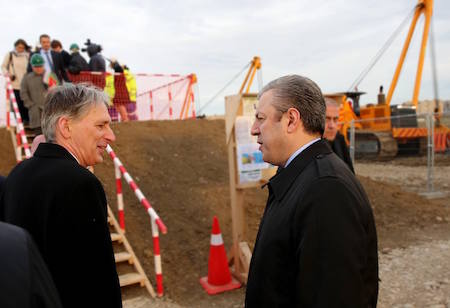South Caucasus Pipeline explosion poses no threat to Georgia, says officials

A major explosion that struck the South Caucasus Pipeline (SCP) in Turkey will not affect Georgia’s gas supply, confirmed a Georgian official today.
The major gas pipeline, also known as Baku-Tbilisi-Erzurum pipeline, exploded unexpectedly in the early hours of Tuesday morning. Part of the pipeline runs through Georgian land, sparking fears the country’s gas supply would be affected.
Today Georgia’s Deputy Minister of Energy Mariam Valishvili confirmed this was not the case.
The explosion occurred in Kars, Turkey and has no influence on our pipeline. Apart from this, the pipeline was inactive to begin with due to ongoing repairs. Therefore, this represents no threat to us,” Valishvili remarked.
The explosion occurred in a section of the SCP in the Sarikamis region of Turkey's north-eastern province of Kars, reported Azerbaijani news agency Apa.az. A nearby forest was successfully protected from the explosion and subsequent blaze. Eyewitnesses later told reporters that the explosion was heard as far as 20km away. Sources said no one was injured in the explosion.
Turkey’s state pipeline company Botas, which is a technical operator of the SCP pipeline on Turkish territory, had earlier started restoration works on the section of pipeline that exploded, reported Azerbaijani news agency Trend.
Meanwhile, Valishvili told Georgian media that the repairs to the exploded section of the pipeline would continue until August 22 before the pipeline becomes operational on August 23.
The explosion is understood to have been caused by a gas leak, local residents in the Kars province where the pipeline lies, told Trend. However immediately after the incident speculation arose that the explosion was the result of a terrorist attack. This notion was reinforced in a statement by Turkey’s Energy and Natural Resources minister Taner Yildiz.
The SCP was built to export Shah Deniz gas from Azerbaijan to Georgia and Turkey.
Official information from the BP website stated the pipeline started at the Sangachal terminal near Baku, Azerbaijan. It followed the route of the Baku-Tbilisi-Ceyhan (BTC) crude oil pipeline through Azerbaijan and Georgia to Turkey, where it linked to the Turkish gas distribution system.
The pipeline has been operational since late 2006 transporting gas to Azerbaijan and Georgia. From July 2007 it started transporting gas to Turkey from Shah Deniz Stage 1.
The pipeline spans a total length of 691km; of which 248km lies in Georgia. The diameter is a 42-inch .
In the first quarter of 2015, the daily average throughput through the SCP was 21 million cubic metres of gas per day.
In Q1 2015 about $12 million was spent in operating costs on the SCP and $245 million in capital expenditure.
The technical operator of the pipeline is BP and the commercial operator is Statoil. From January 1, 2015 the commercial operator of the pipeline was SOCAR.
A BP spokesperson told Agenda.ge that BP was a technical operator of the pipeline that only ran through Georgian territory so it was not responsible for the explosion or in charge of the after response.
Gas started to be delivered along the pipeline from the Shah Deniz gas field in the Caspian Sea in 15 December 2006.
 Tweet
Tweet  Share
Share






